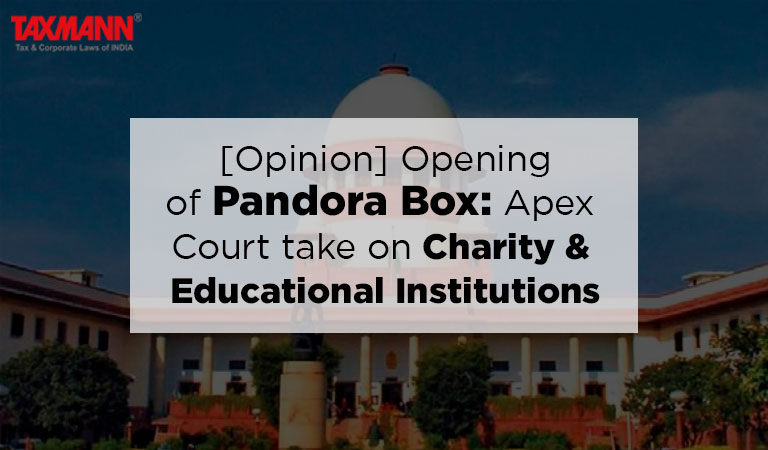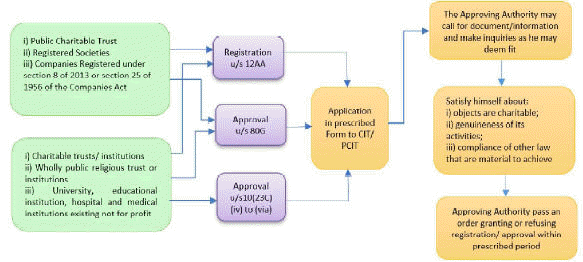[Opinion] Opening of Pandora Box: Apex Court take on Charity & Educational Institutions
- Blog|News|Income Tax|
- 3 Min Read
- By Taxmann
- |
- Last Updated on 7 November, 2022

Navneet Singal – [2022] 144 taxmann.com 89 (Article)
I. Introduction
“If every rich person gave 50 percent of their wealth to charity, I would not say they should pay more taxes.”
The statement above, made by George Soros, one of the world’s richest businessmen and philanthropists, emphasises the importance of tax incentives in promoting charity. Charitable institutions have played a significant role in sharing government responsibility for providing various services to the underprivileged and for the development and welfare of the country. In order to encourage such charitable trusts and organisations, the Indian Income Tax Act has granted exemptions from tax under its various provisions. From AY 2014-15 to AY 2017-18, the amount of exemptions sought has increased from Rs. 2.6 trillion to Rs. 6.9 trillion, as per the performance audit report tabled in the Parliament on August 8, 2022, demonstrate the exponential increase in charitable activities. Along with advancing the noble cause of charity, it is essential to guard against abuse of these exemption clauses. The regulatory restrictions on these institutions have been tightened as a result, making sure that only eligible institutions can be granted this exemption and that it cannot be exploited.
“Experience is making mistakes and learning from them”
– Bill Ackman.
Through learning over the past century, India’s tax laws have experienced multiple changes to the concept of charitable purpose in light of numerous court rulings and dynamic changes in the ecosystem of charitable institutions. The Supreme Court of India (referred to as ‘the SC’ or ‘the Apex Court’ as well) in its recent judgments in ACIT (E) v. Ahmedabad Urban Development Authority ‘Ahmedabad Urban‘ and New Noble Education Society ‘New Noble’ (read along with Misc. application, Dated: November 3, 2022) not only analysed the history of the exemption provisions, but also discussed the myriad national and international rulings on this subject.
In this article, the author has discussed the legal framework of exemption for charitable institutions in India and has made an effort to analyse the provision related to charity in the light of these judgments. Even though the judgments are quite specific to the advancement of objects of general public utility (‘GPU’) and educational institutions, the author has made an effort to understand the impact of these judgments on other limbs of the charity, the actions needed for the present charitable institutions, and the possible way forward for the government authorities and charitable organizations while granting approval for, and applying exemption from tax.
II. Legal Framework for Charitable Institutions in India
Charitable institutions can get themselves registered under various enactments depending upon their legal structure and cause of incorporation, e.g. the Societies Registration Act, 1860; the Religious Endowments Act, 1863, Companies Act, 2013, etc. The Indian Constitution also guarantees a distinct legal space to such institutions through Article 19(1)(c) in the Concurrent List (Item 28), which means that both the Central and the State Governments are competent to legislate on this subject. Further, in the case of foreign contributions, the Foreign Contribution (Regulation) Act, 2010, is also applicable.
The income-tax exemption was provided long ago in the Revenue Act, 1862, which was further inherited in the Income-tax Act, 1922 (‘the Old Act’) and 1961 (‘the Act’). The procedure of registration to avail income-tax exemption can be described in the below diagram, i.e.,

Section 2(15) of the Act defines the expression “charitable purpose” to provide tax exemptions subject to compliance with certain provisions defined in Section 10(23C), Section 11, Section 12, Section 13, etc. of the Act. These entities receive donations, voluntary contributions, and other income from activities that are charitable in nature. The receipts of such entities are required to be applied to the objects for which these trusts and institutions have been set up.
Click Here To Read The Full Article
Disclaimer: The content/information published on the website is only for general information of the user and shall not be construed as legal advice. While the Taxmann has exercised reasonable efforts to ensure the veracity of information/content published, Taxmann shall be under no liability in any manner whatsoever for incorrect information, if any.

Taxmann Publications has a dedicated in-house Research & Editorial Team. This team consists of a team of Chartered Accountants, Company Secretaries, and Lawyers. This team works under the guidance and supervision of editor-in-chief Mr Rakesh Bhargava.
The Research and Editorial Team is responsible for developing reliable and accurate content for the readers. The team follows the six-sigma approach to achieve the benchmark of zero error in its publications and research platforms. The team ensures that the following publication guidelines are thoroughly followed while developing the content:
- The statutory material is obtained only from the authorized and reliable sources
- All the latest developments in the judicial and legislative fields are covered
- Prepare the analytical write-ups on current, controversial, and important issues to help the readers to understand the concept and its implications
- Every content published by Taxmann is complete, accurate and lucid
- All evidence-based statements are supported with proper reference to Section, Circular No., Notification No. or citations
- The golden rules of grammar, style and consistency are thoroughly followed
- Font and size that’s easy to read and remain consistent across all imprint and digital publications are applied



 CA | CS | CMA
CA | CS | CMA
